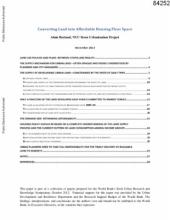Land Library Search
Through our robust search engine, you can search for any item of the over 73,000 highly curated resources in the Land Library.
If you would like to find an overview of what is possible, feel free to peruse the Search Guide.
/ library resources
Showing items 1 through 9 of 107.Au Mali, la gouvernance des terres et des ressources naturelles, longtemps fondée sur le principe de la domanialité publique, n’a pas réussi à mieux sécuriser les droits des communautés locales ni à empêcher la dégradation desdites ressources.
Au Cameroun, l’augmentation des investissements à grande échelle, dans des secteurs tels que l’agro-industrie, l’exploitation minière et forestière, a entraîné de nombreux transferts de droits fonciers des communautés locales vers les acteurs commerciaux.
Indonesia represents an interesting case for analysis of the relationship between multi-level governance and climate governance for three main reasons.
Le climat de la planète Terre change et le Cameroun, comme d’autres nations africaines, en subit les conséquences.
Comment retrouver une capacité à agir pour un idéal de justice sociale et écologique ? Comment remobiliser nos sens et habiter en conscience et en responsabilité nos territoires ?
Ulaanbaatar's (UB) population has swollen from half a million in 2001 to approximately 1.2 million in 2011, accounting for over 40 percent of the country's population. This trend is likely to continue as economic growth is increasingly concentrated in UB.
This housing policy in developing
countries, conjectures and refutations article discusses
housing policy in developing economies. It examines recent
research findings in light of earlier arguments as to the
The rapid urbanization in many
developing countries over the past half century seems to
have been accompanied by excessively high levels of
concentration of the urban population in very large cities.
Cities emerge from the spatial concentration of people and economic activities. But spatial concentration is not enough; the economic viability of cities depends on people, ideas, and goods to move rapidly across the urban area.








